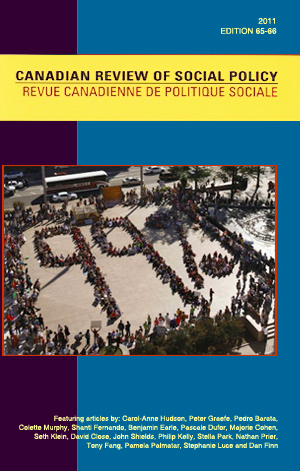Linking Poverty Reduction and Economic Recovery: Supporting Community Responses to Austerity in Ontario
Résumé
This paper examines how a discourse around those living in poverty has been created, and its implications on effective poverty reduction policies. We focus on this change through an examination of changes in the discourse of poverty in Ontario beginning with the Harris government (1995-2002) and in the wake of the Great Recession of 2008, we illustrate how the approach to poverty reduction has fundamentally changed. We examine Ontario’s current poverty reduction strategy and the Poverty Reduction Act, 2009, in addition to the federal policies that have been called for and where poverty reduction now stands at that level. By identifying gaps in poverty reduction strategies, we can see the importance of local action for fostering change in the discourse and advocating for increased efforts. We illustrate this through a case study chronicling the Northumberland Poverty Reduction Action Committee (NPRAC), an umbrella organization representing a coalition of community groups devoted to regional poverty reduction in Ontario. Fiscal austerity at the federal level, however, affects provincial and local capacity and action. We argue that groups such as NPRAC represent both a reaction to the gaps in effective provincial and federal government strategies and a fulfilment of government expectations for an ongoing third sector role. The implication is clear: Poverty reduction needs to be back on all political agendas. Cet article porte sur l'émergence d'un discours concernant les personnes vivant dans la pauvreté et en étudie les répercussions sur l’efficacité des politiques de réduction de la pauvreté. Nous mettons l'accent sur ce changement en examinant l'évolution du discours sur la pauvreté en Ontario, en commençant par celui du gouvernement Harris (1995-2002) et ce, jusqu’à la crise de 2008. Nous démontrons comment l'approche privilégiée en matière de réduction de la pauvreté a fondamentalement changé. Nous examinons la stratégie actuelle de l'Ontario en la matière et la Loi de 2009 sur la réduction de la pauvreté, ainsi que les politiques fédérales qui ont été nécessaires, et nous faisons le point sur la situation actuelle. En cernant les lacunes propres aux stratégies de réduction de la pauvreté, nous soulignons l'importance de l'action locale qui permet de favoriser le changement du discours politique et d'encourager les efforts supplémentaires allant dans ce sens. Nous illustrons ces propos par une étude de cas décrivant le Northumberland Poverty Reduction Action Committee (NPRAC), un organisme-cadre représentant une coalition de groupes communautaires œuvrant en faveur de la réduction de la pauvreté régionale en Ontario. Cependant, la politique fédérale d'austérité fiscale entrave la capacité et l’action tant à l’échelon provincial que local. Selon nous, l’existence d’entités comme le NPRAC représente à la fois une réaction à l’absence de stratégies provinciales et fédérales efficaces et la concrétisation des attentes gouvernementales quant au rôle pérenne que devrait jouer le tiers secteur. Les conséquences sont claires : tous les programmes politiques doivent remettre la réduction de la pauvreté à l'ordre du jour.Publié-e
Comment citer
Numéro
Rubrique
Licence
1-The author guarantees that the manuscript is an original work not published elsewhere in print or electronically in whole or in part, except in abstract form, that the author has the full power to make this contribution, and that the manuscript contains no matter libelous or otherwise unlawful or which invades the right of privacy or which infringes any proprietary right.
2-The author guarantees that the manuscript has not been previously published in print or electronically and that if the manuscript contains any tables, figures or images fully reproduced or closely adapted from previously published material, the author must obtain the necessary permission from the author/publisher holding the original copyright prior to publication in CRSP. The author may be required to produce evidence of permission granted to CRSP’s editors.
3-As a condition of publication in CRSP, the author assigns all copyright to CRSP, including but not limited to the right to publish, republish, and otherwise distribute this manuscript in print, electronic, or other formats. As CRSP is a non-profit interdisciplinary scholarly journal, the author will receive no royalty or other monetary compensation for the assignment set forth in this agreement.
For the purpose of full disclosure, CRSP will not normally use the content provided by the author in a commercial venture, but for the purpose of disseminating the author’s content to as many readers as possible. For distribution, third parties engaging in commercial activities may be contracted to distribute the content globally, and such parties may make a profit out of the author’s content in their normal course of business. CRSP will not pay the author or reimburse the author in any form based on such commercial activities because the conduct of such commercial activities is outside the control of CRSP.
Any future reference to or use of this published material by the authors must acknowledge CRSP as the original place of publication.
PERMISSION REQUEST/ARCHIVING
Permission is given to author(s) receiving funding via Tri-Council Agencies, the Canadian Institutes of Health Research (CIHR), the Natural Sciences and Engineering Research Council of Canada (NSERC) and the Social Sciences and Humanities Research Council (SSHRC), to make their publications freely available in an Open Access repository within the stated deadline by the Tri-Council Agencies (12 months following publication). Archiving of publication must be a manuscript copy bearing none of the CRSP headers, footers or any other distinguishing marks. No links to the article on the CRSP website is permitted.
Permission requests from third parties to reproduce articles in part or full in academic/educational publications can be directed to the managing editor of CRSP, and will not be unreasonably denied.

